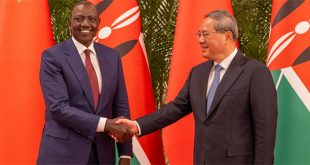
Rwanda’s formers Health minister Agnes Binagwaho
Kampala, Uganda | SASHA INGBER | Years before she became the health minister of Rwanda, Agnès Binagwaho tried to lock a fellow pediatrician in a hospital room. She saw a doctor in an examining room with a mother who held her sick daughter in her arms. And he was asleep.
When Binagwaho saw the scene, she was appalled. She examined the girl herself in a separate room and then asked the child to shut the door on the doctor, who wouldn’t be able to get out without the nurse’s key.
The medical staff wasn’t too pleased. “They found me more guilty for trying to close him in that room for the night than him for mistreating the kid who could have died,” she says.
Throughout her life, Binagwaho — affectionately called “Dr. Agnès” by colleagues — has been unafraid to defy authority by speaking her mind. In the process, she has helped to transform Rwanda’s health system.
In 2015, she was given the $100,000 Roux Prize from the Institute for Health Metrics and Evaluation at the University of Washington, cited for using data to improve the country’s health care. When she found that a significant number of Rwandas were dying soon after birth, Binagwaho and her staff invested in equipment and training to bring down the number of neonatal deaths, a campaign that has seen success.
She has used “data to effectively and efficiently overcome Rwanda’s health challenges,” says Tom Achoki, IHME director of African initiatives.
And now she’s a movie star as well. Binagwaho appears in the new documentary `Bending the Arc’, about the groundbreaking methods Partners in Health uses to deliver health care. In the film, she definitely speaks her mind. At a meeting where questions are raised about allocating funds for health care in a poor community, she says bluntly, “People are dying, brother.”
“She is both doing the work and holding this utopian goal in mind,” says Dr. Paul Farmer, co-founder and chief strategist of Partners In Health, which delivers health services to poor countries, including some of Rwanda’s most destitute villages. Farmer met Binagwaho at a U.N. General Assembly meeting on AIDS in 2001 and was immediately impressed by “all her sassitude.”
When a man made a sexist remark about Binagwaho during a delegation trip, she wryly informed the laughing crowd that she would prescribe him Viagra.
She also fought to provide Rwandan girls with HPV vaccinations to lower their chances of getting cervical cancer by partnering with American pharmaceutical company Merck. About 93 percent of eligible girls were vaccinated; people in developing countries often wait years for vaccinations available in high-income countries.
“When I was a little mouse, I tried to make as much noise as a lion,” she says. “When I became stronger, I made less noise because the objective was to change. And sometimes to change, you better study and try to do it without screaming too much.”
Binagwaho was born in Rwanda but her father moved the family to Belgium in 1958, when she was three years old, so that he could attend medical school. A year after they left, Rwanda’s “Wind of Destruction” began — clashes between two ethnic groups that resulted in the deaths of thousands of Tutsis.
She says her parents didn’t teach her much about Rwandan culture, thinking she would never return. But it didn’t matter. “I always believed I was a Rwandan,” she says. “I had a sense of belonging but to what, I was searching.” She read books written by Rwandans and went to events with fellow Rwandans.
In 1994 while in France, she watched news reports about 800,000 Rwandans who were murdered in 100 days. Two years after the genocide, she returned to the country. Her husband had lost half of his family and wanted to go back. She went — not knowing the national language of Kinyarwanda — and saw people so depressed that they stopped caring about life.
“Everything was destroyed. Even the morale of the people was destroyed. That means there was also no accountability — health professionals were careless and created a lot of damage. But even with the little we had, we could have done better.”
 The Independent Uganda: You get the Truth we Pay the Price
The Independent Uganda: You get the Truth we Pay the Price



